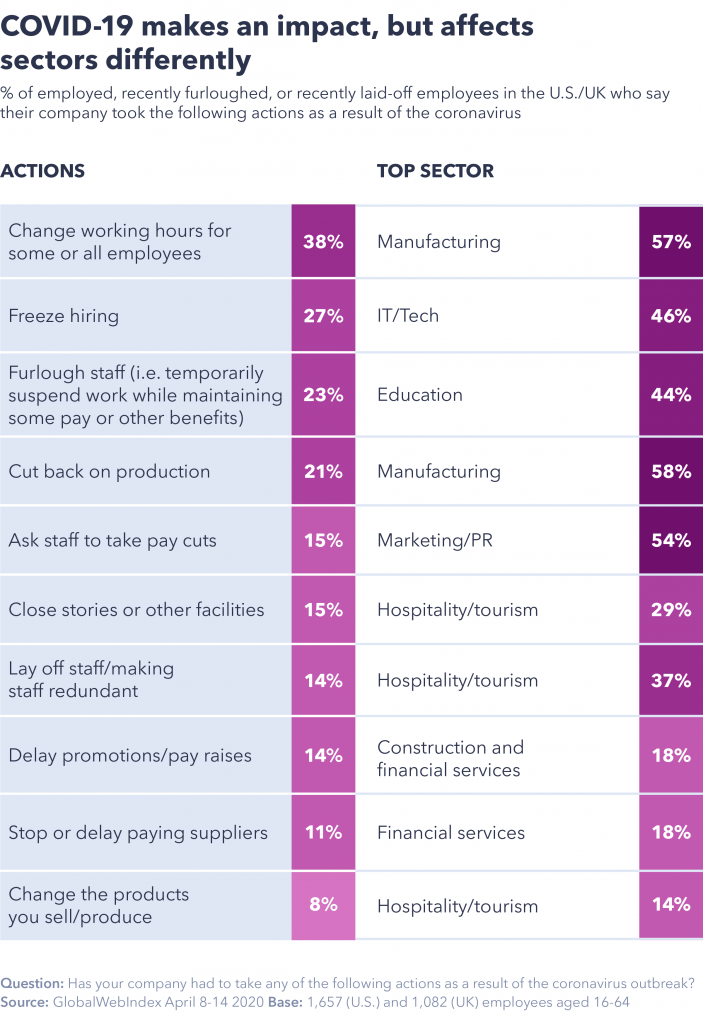Across the world, many workers from different sectors are being asked to work from home wherever possible for their own safety and that of others.
Working from home has become the new norm during this time, and employees have had to adapt quickly. But such significant shifts to an employee’s work-life come with their own set of unique challenges.
Are businesses efficiently equipped to operate remotely? What do employees need to effectively work from home? What are the benefits and challenges people are experiencing with working from home?
Our latest research ran in the U.S. and UK between 8th-14th April answers some crucial questions about working remotely during this time.
Most are working remotely, but many businesses aren’t ready.
Across both the U.S. and UK, remote working is prevalent – more notably in the U.S. Among current workers in the U.S., 77% say their company has given them instructions to work from home or work remotely as a result of the outbreak compared to 51% of workers in the UK. However, it’s still a majority across both markets.
There’s also some clear differences by income – 85% of high-income earners say their company has transitioned to remote working compared to 68% of lower-income earners.
Reassuringly, the majority of workers have transitioned to remote working, but our data shows that many employees feel their companies simply aren’t ready.
While just over half of professionals in the U.S. and just over 2 in 5 in the UK feel their company is equipped to operate with a fully remote staff, many employees don’t feel the same way.
Close to 30% in the UK and 22% in the U.S. say their employer is not equipped to operate with fully remote staff.
A further 1 in 5 in the UK and around 1 in 4 in the U.S. selected a neutral response. These perceptions suggest there’s a lot employers need to do to make working from home effective during this time.
Unsurprisingly, this differs considerably when we break it down by certain sectors.
Employees in the IT/technology (76%) and financial services (68%) sectors are most likely to say their employers are equipped for remote working. Given the nature of the business – where remote working is more easily implemented, or in many cases, already common – this finding makes sense.
In comparison, 48% of professionals in the manufacturing sector say their employers aren’t prepared for remote working.
Every sector is facing its own challenges.
We asked professionals in the U.S. and UK what actions their company has had to take as a result of the crisis. It’s clear the impact on businesses is widespread, with each sector facing its own challenges.
The top action employees say their company has taken is to change working hours for some or all of their employees (38%), with the manufacturing sector being the most impacted.
Many employees also say their employers have had to take the following actions for at least some of their employees:
- Freeze hiring (27%), impacting the IT/technology sector the most (46%)
- Temporarily suspend staff while maintaining some benefits (23%), impacting the education sector greatly (44%)
- Cut back on production (21%), which, unsurprisingly, affects manufacturing the most (58%).
Fortunately, most of these actions are likely temporary and will resume to normal once the outbreak is over.
Unfortunately, however, it’s employees in the hospitality and tourism industry that look set to face some of the most significant and lasting impacts.
Close 2 in 5 employees in the hospitality and tourism sector say their company has laid off staff and a further 3 in 10 say their company has closed stores or other facilities. This indicates that for some businesses, the impact will be more long-term, and could mean they have a harder time bouncing back.
While for others, like big tech giants, the current situation presents big opportunities.
Flexibility and distractions are the biggest pros and cons.
The ability to work from home is often seen as a significant plus, with many employers offering it as one of their perks. Many professionals might already be used to it, while for others, it could be their first time.
But when working from home is no longer a choice, it’s not so straightforward.
Among those who are working from home, the biggest benefit overall is more flexible working hours (58%), followed by the added free time of not commuting (47%).
The ability to wake up later than usual, use that extra time in the morning to spend time with family, or do some exercise is something that is appealing for many.

Time is valuable, and in our usual fast-paced world we often don’t have the luxury of grabbing these extra minutes. This added flexibility and convenience could lead to happier, and more productive employees – in the right conditions.
Back in 2015, Nicholas Bloom, an Economist at the Stanford Institute for Economic Policy Research, carried out a work-from-home experiment on employees at Ctrip, a Chinese-based travel company.
The results found that working from home during a nine-month period led to a 13% increase in performance, almost an extra day of output per week, and a 50% drop in employee turnover.
It was so successful that Ctrip rolled out working from home to the entire company.
But today, Bloom believes the working conditions at home right now will “create a productivity disaster for firms”.
This is down to employees’ present conditions. In normal work-from-home days before the outbreak, most people likely didn’t have to manage the added pressures of looking after children or working in the same space as their partner, spouse, or family members.
And from our own research, distractions in the home are the biggest challenge faced by 46% of employees working from home.
Additionally, close to 3 in 5 are struggling to separate their work-life from their home-life.
This is because of the space we’re in. Everyday, we’re working and living in the same space with limited respite, which makes it difficult to detach ourselves from our work, and subsequently affects our wellbeing.
It also makes it easier to fall into the trap of starting work earlier, working through breaks or lunches, or working later than usual.
It’s absolutely vital that employees try to retain some kind of normal routine and establish boundaries, like waking up at the same time, getting dressed, taking breaks, and starting and finishing work at a reasonable time.
Much of the onus rests on employers to proactively reinforce and encourage this.
Connecting and communicating is key.
Some of the other challenges faced by employees who are working from home relate to communication.
Close to 3 in 10 say they find it challenging to maintain communication with their coworkers and 1 in 5 find it difficult to maintain communication with clients.
A further 1 in 5 also say they’re feeling isolated or lonely.
These challenges could not only affect productivity but could also have a significant impact on employees’ mental health.
One way of curbing this impact is to ensure regular check-ins with colleagues and managers through video calls rather than phone calls.
Having the right technology and communication systems in place are crucial to work-from-home success. Many companies are already doing this. Zoom, the video conferencing platform, has seen its stock skyrocket by 101% since the end of January, adding millions of new users.
But there’s plenty of room for improvement.
When we asked employees who are working from home what they most want from their employer to support them, 41% said they want better home office equipment, 36% said they want better communication tools, 32% want more transparency about the company’s response to the outbreak, and 31% want their employer to check in on their wellbeing more often.
Employers not only need to step up and make sure employees have the necessary tools in place to effectively do their work, they also need to ensure the wellbeing of their team – even if they’re not in the office.
It’s very easy for “out of sight, out of mind” syndrome to appear, but employers need to proactively ensure this doesn’t happen.
These are overwhelming and stressful times for all, there’s no doubt about that, but now’s the time for compassion and kindness to lead the way.

